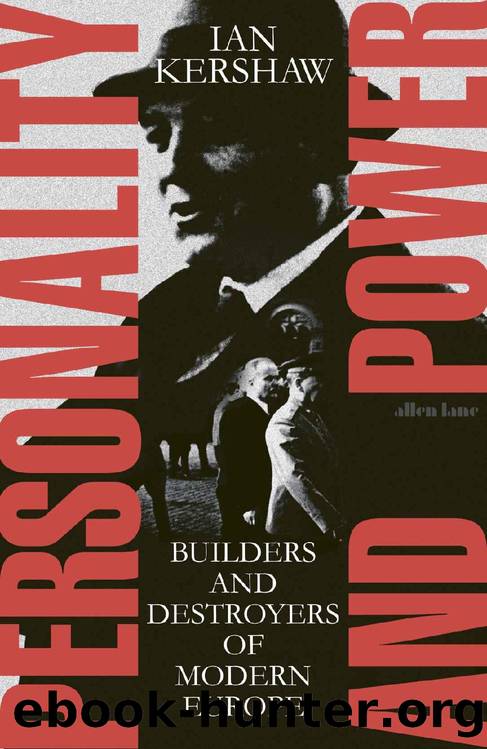Personality and Power: Builders and Destroyers of Modern Europe by Ian Kershaw

Author:Ian Kershaw [Kershaw, Ian]
Language: eng
Format: epub
Tags: History, Europe, General, Modern, 20th Century, Political Science, History & Theory, Historiography, Political Process, Leadership
ISBN: 9780141998244
Publisher: Penguin Books Limited
Published: 2022-09-28T19:00:00+00:00
WORLD WAR AND COLD WAR: FRANCOâS TWO FACES
Throughout the Spanish Civil War, Franco had been in awe of Mussolini and even more so of Hitler. During the first years of the Second World War while the Axis powers seemed to be heading for victory Franco courted both dictators. He felt ideologically in tune with them. More than that, he saw advantages for Spain from the war itself, and from what he took to be the certain defeat of western democracy by Fascist Italy and Nazi Germany. He wanted Spain to join the Second World War as a belligerent power and to share in their imagined triumph.
That was, naturally, not the image he wanted to portray either to the Spanish people or, more importantly, to the victorious Allies once the Second World War was over. As the war began to turn against the Axis powers and their defeat became ever more certain, Francoâs early enthusiasm wilted. At the same time, Spanish propaganda began the process of reversing the public image of the Caudillo from avid supporter of the Axis to wise leader whose brilliant diplomacy had skilfully kept Spain out of the war and nobly preserved the countryâs neutrality. It marked the start of the attempt in the immediate post-war world to overcome the hostility of the West and to end Spainâs pariah status in international relations. But the strategic demands of the Cold War, not Francoâs own abilities or efforts, brought the breakthrough to Spainâs partial rehabilitation. During both the Second World War and the Cold War, external factors, not Franco himself, were the key determinants in shaping Spainâs international relations. Franco represented their contradictory public face.
There is no doubt that Franco took the decisions that defined Spanish policy. The ultimate responsibility was his. But nothing indicates that he took them âagainst the grainâ, that he was doing other than giving expression to the collective voice of Spainâs power-elites. The decision, moreover, not to enter the war simply reflected Spainâs economic and military weakness. An alternative decision was scarcely possible. Had another military dictator been in charge of Spainâs fortunes, policy would most likely have been identical, or at least very similar. Franco was not a weak dictator, since he held real power and his authority was accepted by the whole of Spainâs ruling class. But his actions were constrained by non-personal determinants. Left to Francoâs personal choice, Spain would have found itself a belligerent nation, fighting on the side of the Axis.
Franco regretted that war in Europe had come too soon for Spain, which was in no state, militarily or economically, to join in the fighting. His confidence that Britain would soon have to seek peace was accompanied by the decision, taken on the recommendation of his economic âexpertsâ, to cut off Spainâs economy from the West in favour of autarky (self-sufficiency). The result was to intensify the already acute hardship felt by most of the population and create disastrous shortages in food and other everyday necessities.39 The demand
Download
This site does not store any files on its server. We only index and link to content provided by other sites. Please contact the content providers to delete copyright contents if any and email us, we'll remove relevant links or contents immediately.
Machine Learning at Scale with H2O by Gregory Keys | David Whiting(4292)
Never by Ken Follett(3937)
Harry Potter and the Goblet Of Fire by J.K. Rowling(3848)
Unfinished: A Memoir by Priyanka Chopra Jonas(3381)
Fairy Tale by Stephen King(3370)
The Man Who Died Twice by Richard Osman(3072)
Will by Will Smith(2908)
Rationality by Steven Pinker(2352)
It Starts With Us (It Ends with Us #2) by Colleen Hoover(2341)
Can't Hurt Me: Master Your Mind and Defy the Odds - Clean Edition by David Goggins(2323)
The Dark Hours by Michael Connelly(2300)
The Storyteller by Dave Grohl(2228)
Friends, Lovers, and the Big Terrible Thing by Matthew Perry(2219)
The Dawn of Everything: A New History of Humanity by David Graeber & David Wengrow(2196)
The Becoming by Nora Roberts(2188)
The Stranger in the Lifeboat by Mitch Albom(2113)
Cloud Cuckoo Land by Anthony Doerr(2098)
Love on the Brain by Ali Hazelwood(2059)
Einstein: His Life and Universe by Walter Isaacson(2009)
